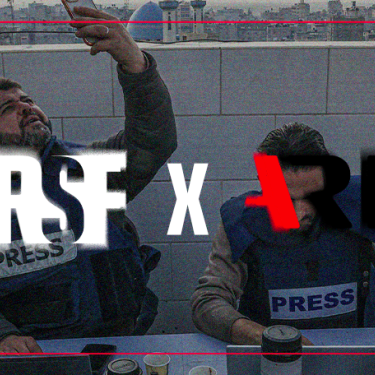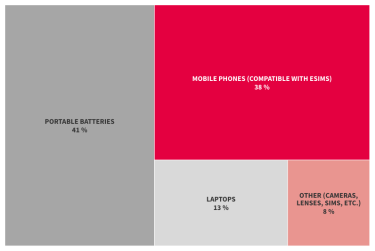RSF has provided Gaza’s journalists with three workspaces and equipment since October

As part of its support for Gaza’s journalists since the start of the war, Reporters Without Borders (RSF) and its local partner, Arab Reporters for Investigative Journalism (ARIJ), have installed equipped tents in Gaza for journalists to work in and have supplied journalists with professional equipment and basic survival products, especially for women journalists.
RSF has been working with ARIJ since the end of October to meet the urgent needs of Gaza’s journalists so that they can keep working in the current horrific environment. Driven from their homes, many journalists lack the basic resources to survive, let alone work. They are also exposed to permanent danger. More than 100 have so far been killed, including at least 22 in the course of their work, and dozens have been injured, according to the information obtained by RSF. Around 50 media offices have also been destroyed by the bombings.
In order to support and protect Palestinian journalism in Gaza, RSF and ARIJ have taken four types of measures: creating a reception space for women journalists, establishing secure and equipped work areas, providing professional equipment and buying products to meet their basic needs.
“With RSF’s help, ARIJ has managed to support over 90 journalists in Gaza,” ARIJ executive director Hoda Osman said. “We have also been able to provide displaced journalists with mattresses, covers, and sometimes tents, and we have set up common journalists working areas. We could not have done all of this without RSF’s support.”
“To address the shocking conditions in which journalists in Gaza are living and working, RSF and its partner ARIJ are providing support in the field to these reporters, so that they can continue to provide the world with reliable and independent reporting from the besieged enclave. We demand their immediate protection.
RSF and ARIJ have provided four main categories of assistance to enable Gaza’s journalists work safely.
1) A reception space for women journalists
During the second month of the war, RSF and ARIJ built a tent to accommodate displaced female journalists. The tent, whose location remains confidential for security reasons, has specially equipped beds on a wooden floor and can accommodate up to six reporters at a time. Displaced women journalists often face specific difficulties and are forced to share bathrooms and sleeping places with male colleagues, which deprives them of any privacy.
2) Workspaces and resources for journalists
RSF and ARIJ have set up two work areas in Gaza. These are tents that are open to all journalists who need a place to work. They are equipped with electricity, Internet, solar batteries, power cords, and work furniture. Each can accommodate around 20 journalists.
3) More than 70 pieces of equipment replaced, distributed
RSF and ARIJ have provided professional equipment to journalists in Gaza whose equipment has been damaged or has been lost in the course of forced displacements since the start of the war. The equipment provided includes phones, laptops, battery packs, digital SIM cards (eSIM) and cameras. This equipment is essential for reporters because of the regular Internet outages. Portable batteries are also crucial because access to electricity is limited.

4) Basic personal products
RSF and ARIJ are providing displaced journalists with essential basic products, including food, winter clothes and underwear, mattresses and blankets, and tents. RSF and ARIJ have faced unprecedented challenges in the course of helping these journalists because the Gaza Strip is continually bombarded, displacing most journalists, often repeatedly. Buying and delivering the basic personal products and the equipment they need to keep working is a dangerous exercise. But, in view of the urgency of the situation and the needs of journalists, RSF and its local partner are continuing with these measures to protect Palestinian journalism and journalists.
